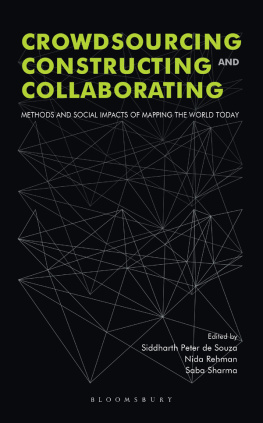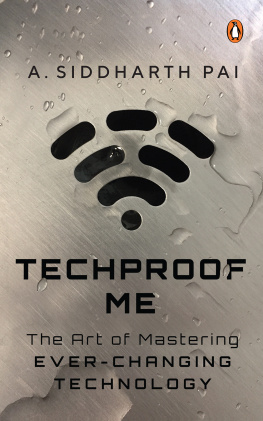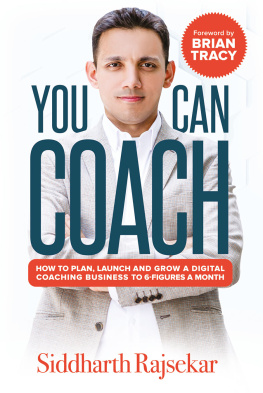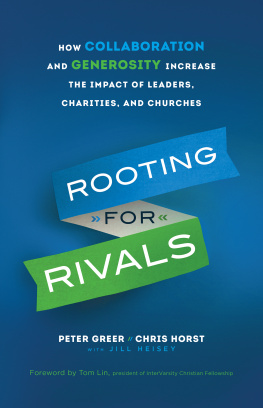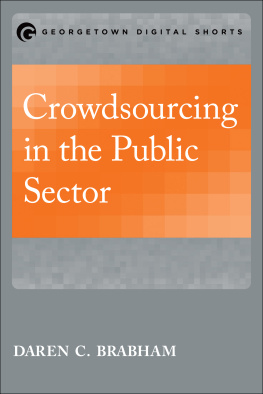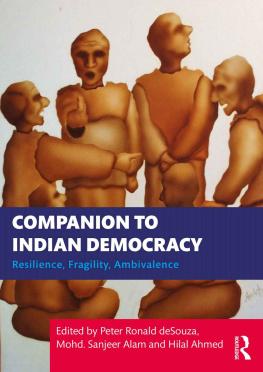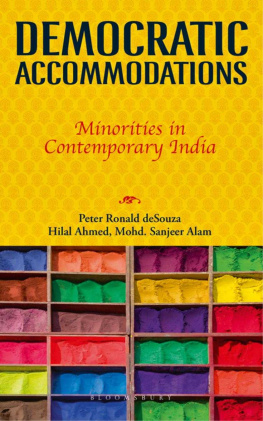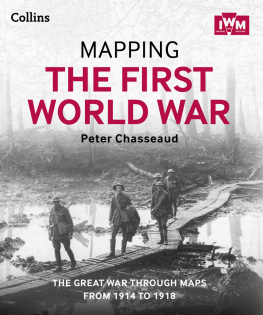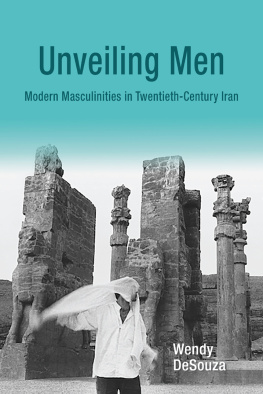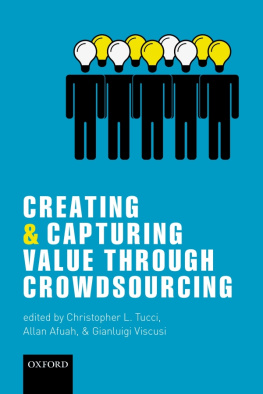Crowdsourcing, Constructing and Collaborating
Crowdsourcing, Constructing and Collaborating
Methods and Social Impacts of Mapping the World Today
Edited by
Siddharth Peter de Souza,
Nida Rehman and Saba Sharma
BLOOMSBURY INDIA
Bloomsbury Publishing India Pvt. Ltd
Second Floor, LSC Building No. 4, DDA Complex, Pocket C 6 & 7,
Vasant Kunj New Delhi 110070
BLOOMSBURY, BLOOMSBURY ACADEMIC INDIA and the Diana logo are trademarks of
Bloomsbury Publishing Plc
First published in India 2021
This edition published 2021
Copyright Siddharth Peter de Souza, Nida Rehman, Saba Sharma 2021
Siddharth Peter de Souza, Nida Rehman, Saba Sharma have asserted their right under the Indian Copyright Act to be identified as Editors of this work
The views and opinions expressed in this book are the authors own and the facts are as reported by them, and the publisher is not in any way liable for the same.
Bloomsbury Academic
An imprint of Bloomsbury Publishing Plc
All rights reserved. No part of this publication may be reproduced or transmitted in any form or by any means, electronic or mechanical, including photocopying, recording, or any information storage or retrieval system, without prior permission in writing from the publishers
Bloomsbury Publishing Plc does not have any control over, or responsibility for, any third-party websites referred to or in this book. All internet addresses given in this book were correct at the time of going to press. The author and publisher regret any inconvenience caused if addresses have changed or sites have ceased to exist, but can accept no responsibility for any such changes
ISBN: HB: 978-93-88630-43-6; eBook: 978-93-88630-45-0
2 4 6 8 10 9 7 5 3 1
Created by Manipal Digital Systems
Bloomsbury Publishing Plc makes every effort to ensure that the papers used in the manufacture of our books are natural, recyclable products made from wood grown in well-managed forests. Our manufacturing processes conform to the environmental regulations of the country of origin.
To find out more about our authors and books visit www.bloomsbury.com and sign up for our newsletters
For Alma and the next generation who will map our world.
CONTENTS
We would like to begin by thanking the contributors to this volume who believed in and engaged with this project, and showed great commitment to see it to its completionLena Weber, Leah Temper, Daniela Del Bene, Hend Alhinnawi, Taha Kass-Hout, Jan Bhm, Rob Shepard, Ahmad Barclay, Joumana al Jabri, Farah Shash, Angie Abdelmonem, Noora Flinkman and Juliana Guarany da Cunha Santos, Sumit Arora, Sandhya Christabel DSouza, Dheeman Ghosh and Rebecca Rumbul. We are grateful that that they invested their time in the book and were willing to share experiences from their wonderful projects, the milestones they have achieved, and the challenges they have faced, openly and with the ambition of building a community of knowledge.
Thank you especially to Nooreen Reza for her commitment to the book and to Intolerance Tracker. We would like to thank Vaibhav Bhawsar and Somnath Ray for supporting Intolerance Tracker with Timescape and helping the project off the ground. Anne Alexander, Emma Mawdsley and Bhaskar Vira from the University of Cambridge have been supporters of the project from its inception and we are grateful for their guidance and advice.
We would like to thank Shannon Mattern for her thoughtful Afterword, and for her enthusiasm and encouragement about the project.
R. Chandra Sekhar at Bloomsbury has been instrumental in seeing this project through, we thank him for his editorial advice and for ensuring the editorial process has been smooth and efficient. We are also grateful to Shreya Chakraborti at Bloomsbury for her help with the editorial process and to the two anonymous reviewers for their helpful comments on the manuscript.
Siddharth would like to thank Nida and Saba for being two wonderful collaborators throughout this process, and for making this project an exciting and meaningful experience for him. He would like to thank his parents Peter and Ligia and his sisters Gayatri and Roshni and Dhulari for their banter, chat and brainstorming whenever called upon and to Pravesh and Rashmi, his in-laws, for their encouragement in seeing this through.
Nida is very grateful to Siddharth and Saba for their energy, enthusiasm and intelligence in this collaboration. She is also thanks her family in Pakistan, Colombia and the US for their support, Daniel Cardoso Llach for his never-ending advice, encouragement and love, and Alma for her company through the final stages of this project and beyond.
Saba would like to thank her parents, in-laws, and Ambika, Vasav and Sarab for their support and company. Nida and Siddharth have been the best possible collaborators to work with.
The last decade has seen a significant rise in the use of internet-based mapping techniques to foster social change. Map-makers and citizens around the worldfrom local groups to large-scale transnational communitiesuse online mapping and collaborating platforms to hold governments accountable, to fill gaps when infrastructural and municipal services are fragmented, to call attention to a variety of issues that impact everyday lives such as sexual or political violence, environmental injustice or corruption and to make visible social and political processes and events that might be otherwise hidden or overlooked. Yet, despite the proliferation of crowdsourced, participatory and data visualisation platforms and despite significant media and scholarly coverage of the types and uses of online maps and their social and political potentials or impacts, there is a surprising dearth of critical reflection on the actual experiences of building and sustaining such platforms. In this collection of edited essays and interviews, Crowdsourcing, Constructing and Collaborating uniquely brings together individuals and groups directly involved in a range of projects from around the world, to critically reflect on the tactics, methods and challenges of crowdsourcing and data visualization, as well as other online mapping tools, to instigate social, environmental and political change. Addressing a range of topical challenges, including corruption, sexual harassment, political violence and environmental conflict in diverse geographic contexts, these projects show how participatory digital media have become crucial components of journalistic, scholarly and activist practices. This book shifts the conversation from maps to the practices of map-making.
From Maps to Map-making Practices
Crowdsourcing, Constructing and Collaborating builds on our work on Intolerance Tracker, which we established in 2016 in collaboration with the online storytelling platform Timescape. Intolerance Tracker was a response to the increasing frequency of social, political, ethnic and gender violence at different scales in South Asia, and an effort to consolidate media reports of instances of violence and hate crimes in order to understand systemic and underlying trends of intolerance in the region and across national boundaries. For this book, we gathered individuals involved in setting up and working with other online map-making platformsthe founders and members of I Paid A Bribe, Environmental Justice Atlas, HarassMap, Intolerance Tracker, Visualizing Palestine, Missing Maps, FemMap, Placing Segregation, Fix My Street and Humanitarian Trackerto discuss the values, methods and experiences of building similar tools for activism, information dissemination, networking and solidarity. Together the different projects represent a range of themes, approaches and objectives that include archiving and documenting contested territories and processes (Visualizing Palestine/Palestine Open Maps, Placing Segregation, Intolerance Tracker), the participatory and urgent mapping of humanitarian and environmental crises (Humanitarian Tracker, EJAtlas, Missing Maps), civic and community initiatives (I Paid a Bribe, FixMyStreet) and feminist and social interventions (FemMap, HarassMap). While the themes are distinct, what ties together the different reflections from the projects is that they are driven by the map-makers themselves. The projects in this book represent a diverse set of issuesenvironmental injustices, civil and military conflicts, corruption, sexual harassment, everyday manifestations of hate and intolerance and more. They feature contributions from across different parts of the globe, with some maps concentrating on local issues, and others adopting global or regional approaches. Each is unique from the perspective of the context they embed themselves in, enabling us to see a wide cross-section of geographies.


